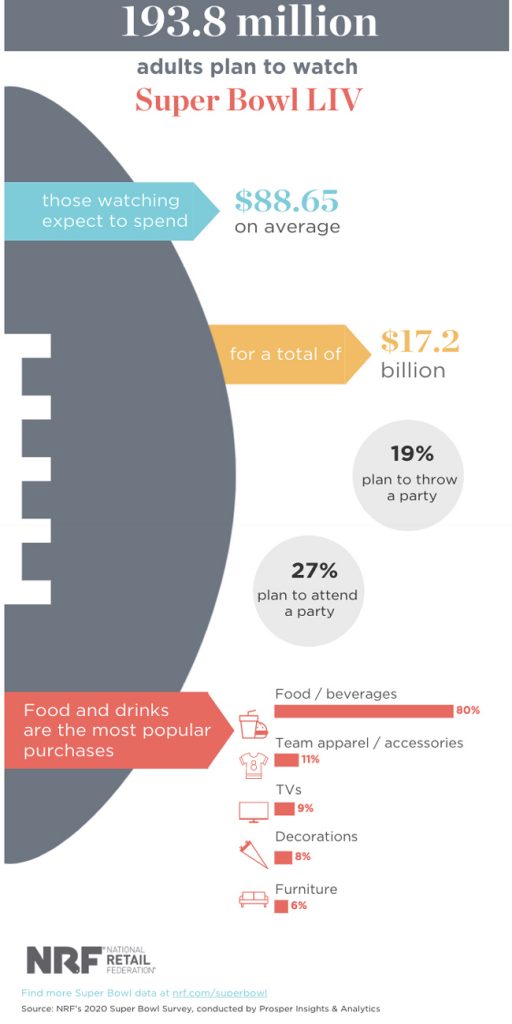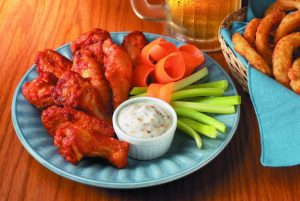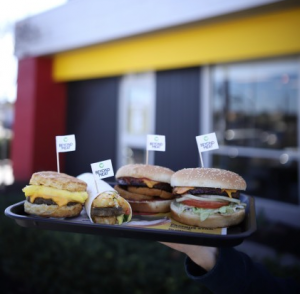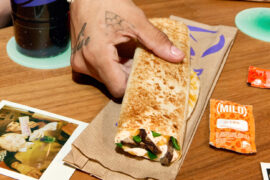The latest consumer spending data from the Washington, DC-based National Retail Federation (NRF) and Prosper Insights & Analytics’ 2020 Super Bowl survey indicate that this may be one of the strongest Super Bowls yet, with nearly 194 million adults saying they have plans for the big game on February 2. Those watching the event on television expect to spend an average $88.65 on food and beverages, merchandise and party supplies, for a total of $17.2 billion across the USA. Approximately 27% of the football fans will be attending parties.
As the San Francisco 49ers and the Kansas City Chiefs prepare to face off in Miami, how are consumers getting ready? See the data in the infographic below and explore NRF’s Super Bowl Dashboard for historical data and trends.

The 2020 survey of 7,267 adults 18 and older was conducted by Prosper Insights & Analytics from January 2-9 and has a margin of error of plus or minus 1.2 percentage points.
So, what are the most popular foods eaten at social gatherings at private homes and sports bars during the big game?
According to The Daily Meal website ranking of the Top 15 Super Bowl Party Foods, Chicken Wings is still #1. In full agreement with that assessment is the Washington, DC-headquartered National Chicken Council, which says that Americans will devour a record-breaking 1.4 billion wings over the two-day Super Bowl LIV weekend.

Here’s How the Other 14 Menu Favorites Rank
#2 Buffalo Chicken Dip; #3 Spinach and Artichoke Dip; #4 Pizza; #5 Seven-layer Dip; #6 Guacamole; #7 Potato Skins; #8 Pigs in a Blanket; # 9 Nachos; #10 Deviled Eggs; #11 Sliders; #12 Pulled Pork Sandwiches; #13, Chili; #14 Dessert; #15 Giant Subs
Beyond the Game
Meanwhile, what about the day after the all-to-often overindulgent big feast on game day? At least two fast food restaurant chains are hoping to turn Monday, February 3 into a meat-free day by giving away plant-based Beyond Meat treats to customers who buy a large drink and say the magic words: “Beyond the Game.”
The day after the Super Bowl is played is notoriously the most skipped workday in America, with an estimated 17.2 million Americans not showing up at the job. Knowing the woes of post-game fever” on one of the worst Mondays of the year, Carl’s Jr. and Hardee’s are providing relief with the chance to try plant-based meat that offers what their marketing departments says is “the best of both worlds – a meal that is satisfying enough to battle your case of the Mondays, without all of the guilt after Sunday’s chips and dip.”
“Carl’s Jr. and Hardee’s recently partnered with Beyond Meat to become one of the first national US quick service restaurants to offer all-day plant-based options for breakfast, lunch and dinner,” said Patty Trevino, senior vice president for brand marketing at Franklin, Tennessee-headquartered CKE Restaurants. “Now, we look forward to providing Americans with a great-tasting, satisfying plant-based meat deal during this particularly tough Monday.”
Among eight products offered are Carl’s Jr. Beyond Sausage Burrito, featuring a 100% plant-based Beyond Breakfast Sausage patty, scrambled egg, shredded cheddar cheese, Hash Rounds, tomatoes and salsa, served in a soft, warm tortilla; Carl’s Jr. Beyond BBQ Cheeseburger, boasting a plant-based Beyond Burger patty topped with Carl’s Jr. original BBQ sauce, American cheese and crispy onion rings, all on a sesame seed bun; Hardee’s Beyond Sausage Biscuit, featuring a 100% plant-based Beyond Breakfast Sausage patty served on our freshly baked Made from Scratch Biscuit; and Hardee’s Original Beyond Thickburger, boasting a plant-based Beyond Burger patty with American cheese, lettuce, tomato, red onion, dill pickles, ketchup, mustard and mayonnaise on a toasted premium bun.

There’s a limit of one per customer for the day, and CKE Restaurants points out that the products are not vegan since they are cooked on the same surface as meat and prepared on shared surfaces.
With both a United States and international footprint, Carl’s Jr. Restaurants LLC and Hardee’s Restaurants LLC have over 3,900 franchised or company-operated units in 44 US states and 42 other countries and US territories.






